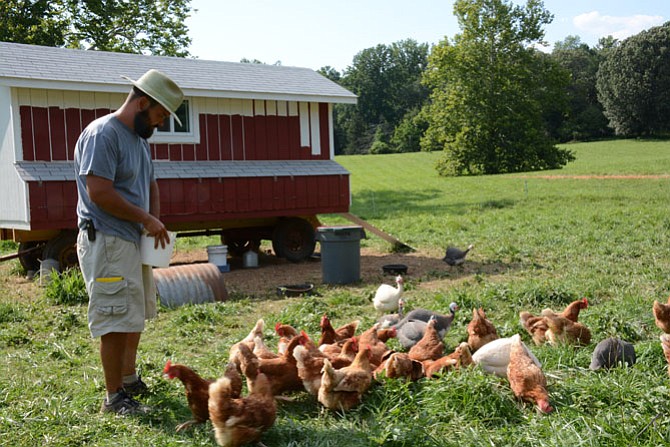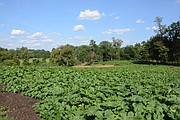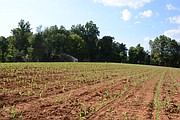Whitehall Farms head grower Brian Yoder of Reston (left) feeds “pastured” chickens. Photo by Tim Peterson.
As Fairfax resident Jeff Waters guided his nimble four-wheeling cart over a bumpy dirt path through the woods on his family’s 200-plus-acre farm, he said confidently, “It’s a lot closer to being done than it looks.”
Waters’ late father-in-law Martin Vazquez and family moved on to the property that borders Clifton, Fairfax Station and Fairfax areas in 1960. Vazquez, a Cuban immigrant, served as a medic in World War II and then started an insulation business with his wife. He put all his money into purchasing the land.
“This was his baby,” Waters said.
Vazquez’s family continued to live on the land and used its 40 to 45 acres of pasture for raising an average 60 head of Angus steer as a “gentleman’s farm,” selling registered breeding stock.
When Waters’ wife Nadine Vazquez’s parents were no longer able to take care of the farm, they all faced a choice: Sell the land to developers or figure out a way to keep it.
Not selling meant finding some way to otherwise monetize the farm. “We wanted to get a viable business going here,” Waters said.
ONE IDEA he considered was operating a paintball course. With around 160 acres of woods on the property and the ability to keep players 500 feet from any roadway, it seemed like a promising direction that wouldn’t require excessive labor or maintenance.
But following some media coverage of the idea, a number of area residents raised concerns about increased traffic and pollution coming to the neighborhood. Waters also said meeting development conditions for Fairfax County became too expensive.
“We pulled the plug on it,” Waters said. “We grew tired of fighting.” That announcement came in February this year. Though earlier in the winter, Waters was already pursuing another route for preserving the land: agritourism.
The Right to Farm Act that went into effect in July 2014 opened the door for Waters to “up the scope” as far as growing produce and livestock on the farm, hiring more people and hosting educational events without as much regulation from the county.
Brian Yoder, a Reston resident and recent graduate of a natural resources Master’s program at Virginia Tech, responded to an ad Waters posted on Craigslist in December for a general manager on the farm. Yoder had the motivation and skill to do more with the land.
Yoder and his wife had been contemplating starting their own farm after he completed his two tours with the U.S. Army flying Boeing CH-47 “Chinook” airplanes.
“There’s a lot to do,” Yoder said, adding that he was excited to find “someone else with the farm and same passion trying to make it happen.”
With paintball pulled, Yoder and Waters put everything into making Whitehall Farms, LLC a reality. For the new vision of the farm, Waters wanted it to be operated by and benefit veterans with a portion of profits. He also wanted all the farming to be done as responsibly and sustainably as possible. Eventually, Waters sees the farm as an educational resource for students and other groups to visit and learn about sustainable agriculture.
“Our only dream is that it stays a farm,” Waters said.
Getting the land back into growing shape has been laborious, with Waters and Yoder putting in between 60 and 80 hours a week. There was considerable brush and outdated fencing to clear before even getting to the soil that had been packed down hard from decades of cattle hooves.
But late-summer vegetables like kale, broccoli and radishes are in the ground, along with a vast pumpkin patch field and 3-acre corn maze (in progress) slated for the farm’s first Fall Festival beginning Sept. 19.
For livestock, Whitehall currently has a dozen grass-fed angus steer, a handful of mulefoot pigs on the way and a few dozen pastured chickens pecking around in a large pen. There are also two retired lieutenant colonels helping out around the place.
“Sustainable farming interests a lot of veterans,” Waters said. He hopes to have many more on the farm in the future, thanks to a partnership with the Arcadia Center for Sustainable Food and Agriculture, based on the Woodlawn Estate in the Mount Vernon area of Alexandria.
Arcadia has its own farm training program for veterans and can expand the operation with Whitehall as a satellite location.
“Veterans, coming out of the military with experience overseas, are really looking for a job that has a purpose to it,” said Arcadia executive director Pam Hess. “They’re accustomed to being part of a really close knit, well-operating team that’s working for something larger than themselves.”
With hardly any other farms in Fairfax County, Hess is also excited about Whitehall’s contribution to the “local food system and economy.”
“The idea of letting Fairfax County residents have actual farms to buy actual food grown in responsible ways is really exciting,” she said.
In keeping with both the veterans-support theme and sustainable growing motivation, Waters and Whitehall have already made significant use of material from Veteran Compost. The Aberdeen, Maryland and Fairfax-based outfit also employs veterans and diverts food scraps from going to landfills.
WATERS AND YODER said they’ll use as much as 3,000 yards of the compost over the next three years, which will decrease the dependence on fertilizer and promote healthier plants that require less spraying for pests.
Making smart decisions about how to grow and what to eat are the core of what Waters calls the “working demonstration farm concept.”
“There’s a renewed interest for people to see for themselves how it’s raised, and what the right choice is,” Yoder said.
For more information, visit www.whitehall.farm, www.arcadiafood.org and www.veterancompost.com.
More like this story
- Fairfax Station and Mount Vernon: Arcadia’s veteran farmers-to-be report for first weekend training
- Clifton: Whitehall Farms Opens Second Fall Fun Days
- Fairfax Station and Clifton: Whitehall Farms Begins Fall Festival
- Mount Vernon: Arcadia Farms Offers Veterans More Purpose in Life
- Mount Vernon Brief: Arcadia Program Seeks Applicants



